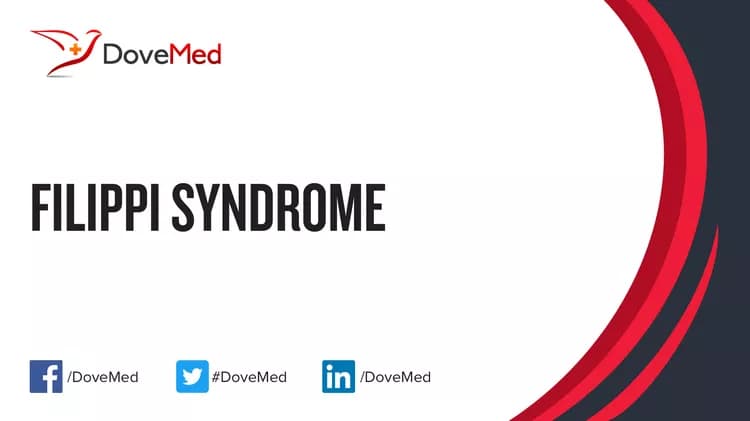What are the other Names for this Condition? (Also known as/Synonyms)
- Scott Craniodigital Syndrome with Mental Retardation
- Syndactyly Type I with Microcephaly and Mental Retardation
- Syndactyly with Microcephaly and Mental Retardation
What is Filippi Syndrome? (Definition/Background Information)
- Filippi Syndrome is a highly infrequent genetic developmental disorder that affects various parts of the body. It is congenital in nature and the presentations are manifested at birth
- Defective mutations of certain genes are responsible for the disorder. Filippi Syndrome is autosomal recessive, implying that the gene defect has to be inherited from both parents to cause the condition
- The characteristic feature of this abnormality is a small head (called microcephaly), webbed toes and fingers, typical facial profile, and developmental retardation
- Symptomatic treatment and supportive care is normally provided. The outcome is generally positive with early management of the condition
Who gets Filippi Syndrome? (Age and Sex Distribution)
- Filippi Syndrome is an extremely rare condition that manifests itself at birth
- No male-female gender preference is observed
- No specific ethnic or racial predominance is observed
What are the Risk Factors for Filippi Syndrome? (Predisposing Factors)
Children born in families with a positive history of Filippi Syndrome genetic condition are at risk. Individuals having consanguineous partners/spouses have the greatest risk.
It is important to note that having a risk factor does not mean that one will get the condition. A risk factor increases ones chances of getting a condition compared to an individual without the risk factors. Some risk factors are more important than others.
Also, not having a risk factor does not mean that an individual will not get the condition. It is always important to discuss the effect of risk factors with your healthcare provider.
What are the Causes of Filippi Syndrome? (Etiology)
- Filippi Syndrome is caused by inheriting an autosomal recessive gene that is defective. The problem gene is responsible for the set of assorted signs and symptoms of the condition
- Researchers are still trying to determine and isolate the specific gene (and the chromosome) that causes this genetic disorder
Autosomal recessive: Autosomal recessive conditions are traits or disorders that occur when two copies of an abnormal gene have been inherited on a non-sex chromosome. If both parents have an autosomal recessive condition, there is a 100% likelihood of passing on the mutated genes to their children. If, however, only one mutant copy of the gene is inherited, the individual will be a carrier of the condition, but will not be present with any symptoms. Children born to two carriers, have a 25% chance of being homozygous dominant (unaffected), a 50% chance of being heterozygous (carrier), and a 25% chance of being homozygous recessive (affected).
What are the Signs and Symptoms of Filippi Syndrome?
Filippi Syndrome mainly affects the head, hands, and feet. Key signs and symptoms are the following:
- Small appearance/size of the body, small head size (seen before and after birth of the child), low birth weight
- High forehead, thin upper lip and nostrils, widely spaced eyes, wide nose, small chin - all features that give a unique facial profile
- Genital abnormalities in the male child
- Other features include: Dislocated elbow, incomplete cleft palate closure, and bone anomalies
How is Filippi Syndrome Diagnosed?
Diagnostic tests for detecting Filippi Syndrome may be performed on pregnant women, or on the newborn child. These include:
- Ultrasound scans on pregnant women are used to observe the classic signs of Filippi Syndrome
- Physical examination of the newborn child and evaluation of the family medical history
- The common traits of Filippi Syndrome that basically help in assessing the condition are:
- Small head size
- Fused digits/webbing on the limbs
- Distinctive facial appearance
- Growth delays
Many clinical conditions may have similar signs and symptoms. Your healthcare provider may perform additional tests to rule out other clinical conditions to arrive at a definitive diagnosis.
What are the possible Complications of Filippi Syndrome?
Complications due to Filippi Syndrome may include:
- Severe mental retardation, learning disabilities
- Cleft palate
- Short stature
How is Filippi Syndrome Treated?
The treatment measures for Filippi Syndrome are commenced immediately on birth of the infant. These include:
- oSupportive care and therapy is provided for individuals with physical and mental disabilities
- Surgical correction of the skeletal and tissue anomalies, including finger/toe problems
- Speech therapy is required for those with a hearing loss
How can Filippi Syndrome be Prevented?
- Currently, there are no specific methods or guidelines to prevent Filippi Syndrome genetic condition
- Genetic testing of the expecting parents (and related family members) and prenatal diagnosis (molecular testing of the fetus during pregnancy) may help in understanding the risks better during pregnancy
- If there is a family history of the condition, then genetic counseling will help assess risks, before planning for a child
- Active research is currently being performed to explore the possibilities for treatment and prevention of inherited and acquired genetic disorders
What is the Prognosis of Filippi Syndrome? (Outcomes/Resolutions)
- With timely and active treatment administration, Filippi Syndrome can be effectively managed and controlled
- Nevertheless, most children suffer from moderate (and sometimes acute) developmental delays with mental retardation
Additional and Relevant Useful Information for Filippi Syndrome:
There are voluntary organizations and support groups that provide help and understanding to the individuals, parents, and families, of Filippi Syndrome affected.
Related Articles
Test Your Knowledge
Asked by users
Related Centers
Related Specialties
Related Physicians
Related Procedures
Related Resources
Join DoveHubs
and connect with fellow professionals


0 Comments
Please log in to post a comment.